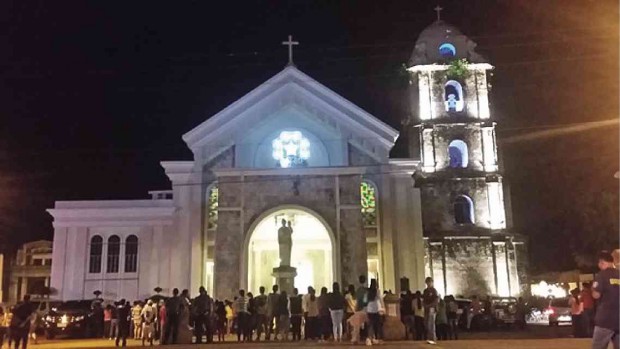‘Simbang Gabi’ in Bohol’s alternative church

BOHOLANO Catholics have filled the churches like St. Joseph Cathedral in Tagbilaran City for the first “Simbang Gabi,” or “Misa de Gallo,” to affirm their faith. LEO UDTOHAN/INQUIRER VISAYAS
CORTES, Bohol—When municipal employee Cecilio Tolop Jr. attended the first of nine “Misa de Gallo” at 4:30 a.m. on Wednesday, he still felt blessed though the Mass was celebrated a few steps away from the damaged Sto. Niño Parish Church in this town.
“We are happy that the new alternative church made of concrete materials is finished in time for the Misa de Gallo,” said Tolop, 51. “This is truly a blessing to all of us.”
At least 600 residents attended the “Simbang Gabi,” held for the first time at the alternative church. Sto. Niño Parish Church, which was built in 1880 and made of coral stones, was damaged when a 7.2-magnitude earthquake shook the island-province of Bohol on Oct. 15, 2013.
At least 24 other ancient churches were either destroyed or damaged. Ten were considered national heritage landmarks.
Simbang Gabi traditionally begins on Dec. 16 and ends on Christmas Eve with the “Misa de Aguinaldo.” The Masses usually start at 4 a.m.
Article continues after this advertisementRepair work on the scarred walls and roof of Sto. Niño church has been shelved as it will entail a cost of millions of pesos. They would get scared when winds blow strong because the church’s bamboo supports were secured only by rattan, Tolop said. “I could barely see the priest through the bamboo poles and stakes,” he said.
Article continues after this advertisementSo for two years, Cortes churchgoers have flocked to the temporary church made of nipa and bamboo.
According to church officials, the Ong family, who owns BQ Mall Corp. in the capital city of Tagbilaran, built the 400-square-meter alternative church with a seating capacity of 300 at a cost of at least P4 million. Construction started in June.
The church is made of concrete with steel beams and iron sheets, according to architect Eunnie Pinoliad. Images of the Child Jesus, Saint Lorenzo Ruiz and the Virgin Mary were taken from the old church and placed on the new altar.
In Tagbilaran, Kevin Epil, 16, who works in a flower shop, had to wake up at 3 a.m. to attend the first dawn Mass at St. Joseph Cathedral. He hopes to complete all nine Masses like what he did over the past five years.
“I have a wish to ask from the Lord—good health for my family,” Epil said.
Bishop Leonardo Medroso reminded some 2,000 people who came to focus on the real meaning of the season, which is to love and be a blessing to others.
“Examine yourself. Look at what deeds you can offer to the Lord,” Medroso said in Cebuano in his homily.
The church has celebrated two special events this year—the Year of Mercy and the 75th diamond celebration of St. Joseph Cathedral. “God will shower his blessings to all his people,” the prelate said.
A familiar scene outside the church over the past years are food stalls selling “sikwate” (hot native chocolate), coffee and native rice delicacies, such as “bibingka,” “suman,” “puto,” “kutsinta,” “biko” and congee.
“Our ‘linog-gaw’ (congee) is our best seller,” said Tessie Labunog-Sumampong of Cuisina ni Tisay.